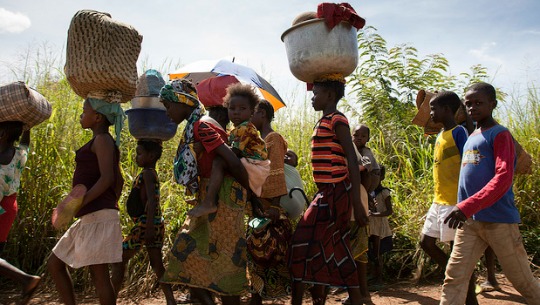By Andrea Germanos
 People fleeing conflict in the Central African Republic. (Photo: UNHCR/ B. Heger)A situation described as a “human catastrophe of epic proportions” is underway in the Central African Republic (CAR), yet has failed to garner widespread media attention.
People fleeing conflict in the Central African Republic. (Photo: UNHCR/ B. Heger)A situation described as a “human catastrophe of epic proportions” is underway in the Central African Republic (CAR), yet has failed to garner widespread media attention.
On Monday, United Nations Deputy Secretary-General Jan Eliasson warned that the impoverished nation was “descending into complete chaos before our eyes.”
Describing the current turmoil in the country, the New York Times reports:
The situation has deteriorated dramatically since a coup in late March overthrew the president, François Bozizé, and installed a new president, Michel Djotodia, who was supported by an alliance of guerrilla fighters known as the Seleka, drawn from neighboring nations and the Central African Republic. Since then, the new government’s formal and informal forces have wreaked havoc or stood by while militia groups destroyed homes and carried out extrajudicial killings, torture and rape, according to human rights groups. […]
Both the former government of Mr. Bozizé and the current one of Mr. Djotodia, which is backed by the Seleka, are accused of serious human rights abuses, including extrajudicial killings and torture, according to a report released in September by Human Rights Watch.
However, since the beginning of 2013, many of the abuses of civilians have been carried out in Seleka-dominated territory, according to the report. Tensions are heightened by religious differences between members of the Seleka, who are Muslims, and the predominantly Christian populace, which is increasingly defended by armed Christian groups.
In response to the increasing violence, France’s Defense Minister Jean-Yves Le Drian confirmed on Tuesday his country was preparing to send “about 1,000” troops to the former colony. Those troops are in addition to approximately 2,600 troops deployed by the African Union, ostensibly to protect civilians.
Doctors Without Borders/MSF has warned of “horrific violence” gripping the country plagued by a chronic humanitarian and health emergency.
“We are extremely concerned about the living conditions of the displaced, whether overcrowded in churches, mosques or schools or invisible, living in the bush with no access to healthcare, food or water and threatened by epidemics. Much more needs to be done and it needs to be done now,” stated Sylvain Groulx, MSF Head of Mission in CAR.
Amnesty International sounded alarm as well, stating that a “human catastrophe of epic proportions” was underway in the central African country.
“The crisis is spinning out of control, despite the fact that it has been ignored by the international community for far too long,” said Salil Shetty, Secretary General of Amnesty International.
“There was a time when a humanitarian disaster on this scale would have had the world’s press swarming all over it, or at least received a due amount of attention,” wrote Martin Bell in the UK’s Independent. “Sadly, not here and not now.”
Meanwhile, on Monday, the International Day for the Elimination of Violence against Women, a thousand women staged a protest in the CAR’s capital city of Bangui. The women, whose mouths were taped over in protest of violence against women, held placards reading, “Stop violence against women. I am not an object,” and “No to murders, torture, rape.”















